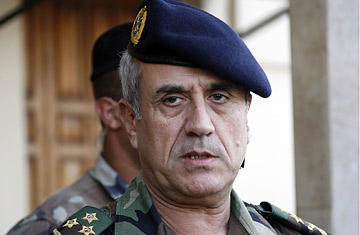
Lebanese army commander General Michel Suleiman.
For more than two years, Lebanon's so-called Cedar Revolutionaries — the country's anti-Syrian politicians — have helped lead the Bush Administration's charge to promote democracy and curb anti-Western extremism in the Middle East. Since the 2005 assassination of former Prime Minister Rafik Hariri, which sparked the anti-Syrian protests in Beirut — dubbed by Washington as the Cedar Revolution — and ended three decades of Syrian domination, the U.S. has backed the pro-Western government in Lebanon in hopes of denying Syria (and Iran) influence in the country.
But now, the White House has begun signaling a new approach to Syrian relations — for starters, it invited Syria to last week's Annapolis peace conference to revive Israeli-Palestinian peacemaking. And Washington's overtures to Damascus, which the U.S. has repeatedly slammed for sponsoring terrorism and meddling in Lebanon and Iraq, have left pro-Western Lebanese leaders worried about being "sold out" as part of a broader U.S.-Syrian deal to stabilize the region.
"The message the Americans are sending to the region is that what succeeds is terror, bombings and a total disregard for democracy," a senior member of the anti-Syrian March 14 coalition in Lebanon tells TIME. "No one is going to remove the feeling from March 14 that we have been dumped by the Americans."
The first sign of this discontent came a day after the Annapolis conference when the March 14 bloc, which forms a slim majority in the Lebanese parliament, revealed that it would back the presidential nomination of General Michel Suleiman, the commander of the Lebanese army — a candidacy that it had previously opposed. The Lebanese presidency has been vacant since November 23 when parliament failed to elect a successor to Emile Lahoud, the pro-Syrian head of state whose term ended the same day. The recent decision by March 14 to opt for Suleiman — who is seen as having close ties to the militant Shi'ite Hizballah, which spearheads the pro-Syrian opposition to the Western-backed government in Beirut — apparently caught the opposition by surprise, not having expected the general's candidacy to be promoted by its political foes.
"The Syrians are very happy," says Sami Moubayed, a Syrian political analyst. "I think this is what the Syrians always wanted — Suleiman." Parliament is scheduled to reconvene on December 7, when Suleiman is expected to be elected President.
With the announcement of Suleiman's candidacy immediately following Annapolis, it was widely assumed that Syria and the U.S. had brokered a deal to fill the Lebanese presidency as a way to help ease months of tension between their respective allies in Lebanon. However, senior March 14 politicians tell TIME that the proposal to nominate Suleiman had arisen more than a week before Annapolis, several days before Syria even announced it would attend the peace conference. The anti-Syrian block had determined it was better to choose a President acceptable to the opposition than risk a prolonged constitutional vacuum and the threat of violence erupting in Lebanon between rival factions. "We're sure that Suleiman is better than the void," says an adviser to Saad Hariri, whose Future Movement is the largest component of March 14.
Another reason Suleiman got the nod was, perhaps, simply the lack of a better option: March 14 had determined that it had few chips left to play, given that the Bush Administration had apparently withdrawn support. "With America's realignment and engagement with Syria, obviously [the U.S.] cannot exert pressure on Syria anymore. We understood the message and acted appropriately," says Ghattas Khoury, a member of March 14.
U.S. officials insist, however, that March 14's fears are unfounded. "There was no deal with the Syrians at Annapolis about Lebanon," Jeffrey Feltman, the U.S. ambassador in Beirut, tells TIME. "There will be no U.S. deal with the Syrians regarding Lebanon's presidency. This is an issue for the Lebanese alone to work out."
But it will be a tough sell convincing the anti-Syrian coalition in Beirut that the Bush Administration's support is unstinting. After all, they still remember that it was Bush's father, President George H.W. Bush, who green-lighted Syrian hegemony over Lebanon in 1990, in exchange for Syria's help in ousting Iraqi forces from Kuwait.
Indeed, Lebanon has a long and unhappy tradition of being the battleground for competing foreign powers. Lebanese political bosses accept the support of foreign patrons to gain extra leverage against domestic rivals, while regional powers use their proxies in Lebanon to fight their own battles. It is a symbiotic relationship that seems to benefit everyone but the host; over the past two centuries, it has repeatedly plunged this tiny Mediterranean country into violence, and threatens to do so again today.
Once again, instability may come at the hands of Washington. Since 2005, the U.S. has lent the pro-Western government support, as Lebanon teetered on the edge of chaos, wracked by a war between Hizballah and Israel, battles with al-Qaeda-style militants, further assassinations of anti-Syrian politicians, economic stagnation and political gridlock. But now the Administration seems to be having a change of heart on Syria — recognizing that, like it or not, Damascus remains integral to almost every challenge in the Middle East: Lebanon, Iraq, Iran, Israel-Palestine. "The Administration was only using a policy of sticks [against Syria] and now it is going to use some limited carrots as well as sticks and see if it yields results," says Andrew Tabler, editor of the Damascus-based monthly magazine Syria Today.
Small comfort, perhaps, to the anti-Syrian legislators in Lebanon who fear — rightly or wrongly — that history is repeating itself, with Washington once more sacrificing their interests on the altar of political expediency.
